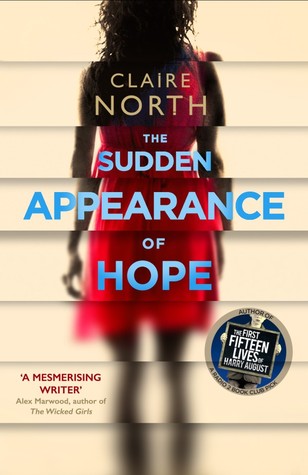Touch by Claire North
Touch is the third Claire North book I’ve read and, whilst it is very good, it bears more than a little resemblance to The Sudden Appearance of Hope, the book which followed Touch but I read first. This similarity undermined it slightly for me, but nonetheless this is another exciting sci-fi tinged thriller from someone who seems to be a master of them.
Claire North’s books are about people with strange abilities, which are both a blessing and a curse, hidden within our world. Where The First Fifteen Lives of Harry August covered reincarnation, and The Sudden Appearance of Hope the idea of being forgotten, Touch is about a being (known as a ghost) that possesses different bodies but has no form left of its own, transferring through touch. The protagonist is known as Kepler and is around 300 years old, hopping from host to host, usually with the host’s consent in exchange for a large pay-out at the end of the possession. When Kepler, in her host Josephine, is gunned down in a Turkish train station, Kepler manages to escape before her host dies and goes on the run in the body of her would be assassin, pursued by the mysterious organisation to which he belongs.
Touch, similarly to her other books, is a globetrotting conspiracy story, as the protagonist moves through a vast range of locations, exploring what it means to be human. It does this very well, but by this point the three books have begun to blur into one. She’s chosen a particular thing that she is going to do and she does it really well, but an element of fatigue begun to slip in. I probably should have left a bigger gap between The Sudden Appearance of Hope and this. Where Harry August posits that humanity is tied to mortality, and Hope Arden suggests it is tied to connections we make to each other, Touch is about the physical body itself. The horror inherent in the concept is not shied away from; although Kepler herself is sympathetic, North never suggests that the experience of having your body stolen against your will is anything but terrible. One plot thread involving a body taken for decades is particularly harrowing. The flashback stuff is generally very good, with some great scenes set in the Ottoman Empire and 1950s Hollywood. The present day storyline stumbles slightly, with lots of scenes of Kepler travelling places and investigating things and generally moving the plot forward, but in a rambling and vague fashion. Touch, and to an extent all of North’s books I’ve read, seems to be at their best when simply wallowing in its own concept, with the core narrative holding it all together being somewhat less compelling.
You may have noticed that I’ve gendered Kepler as female when I refer to the character; her biological sex naturally varies depending on her host, but the voice that came through all of these I couldn’t help read as female. I could go through everything I’ve written and alter the pronouns to ‘it’ and I almost did exactly that, but I actually think it’s interesting how Touch ended up making me project gender onto a genderless entity. I wonder what in my own personal biases made me read Kepler as female, because I’ve read that many people have read the character as male. In Kepler, North provides an interesting cipher to examine our own thought processes and assumptions. An area I wish North had touched more upon was the racial element; Kepler refers to having marched as an African-American with Dr. King in the 1960s, but at the end she could jump into the skin of a white person and avoid any of the consequences of being black in America. North prods at the idea of appropriation, but never really jumps into it. Since the big conceptual stuff worked more for me than the core thriller narrative, I’d have liked to see Touch go further down this path.
All said however, Touch is a very good book. If you’ve read any of her other books recently, maybe give it a little break to keep things feeling a bit fresher, but it was nonetheless thought-provoking and intriguing. I don’t know what angle of humanity North is going to pursue next, but I do know it will be interesting.

